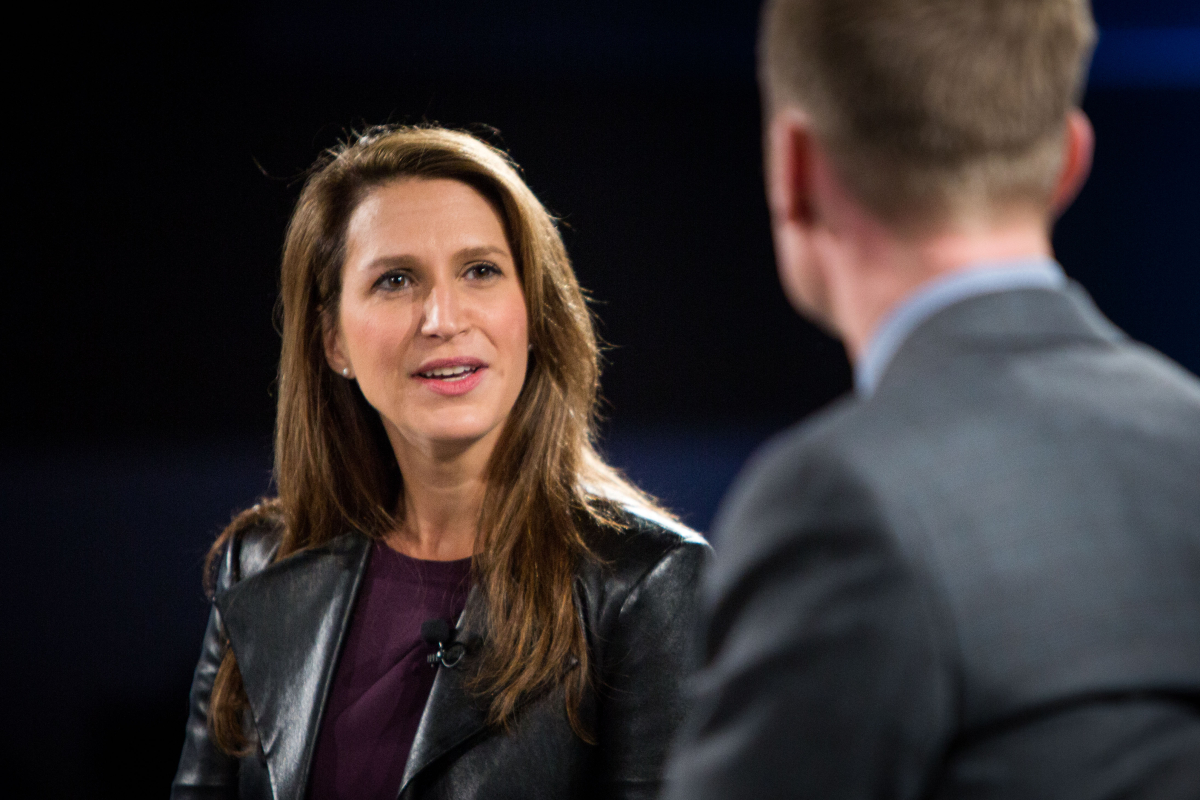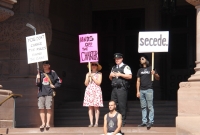Support strong Canadian climate journalism for 2025
Ontario Attorney General Caroline Mulroney should step down rather than go to bat for Premier Doug Ford’s use of a loophole in the Constitution to override democratic rights, say some prominent critics.
If Mulroney faces a difficult choice between her allegiance to the premier and her allegiance to the law, she should resign, said Anne McLellan, a former attorney general of Canada, in an interview with National Observer about the general duty of attorney generals.
“You have to provide impartial advice,” McLellan said. “And if it’s a matter of principle you should resign.”
Legal professionals and critics alike have questioned where Mulroney’s allegiance really lies — or should lie — in the two weeks since Ontario’s government revealed a controversial proposal to invoke the notwithstanding clause to slash the size of Toronto’s city council from 47 to 25 in the middle of a municipal election.
Just before an emergency midnight legislative sitting on Aug. 17 to debate Bill 31, the Efficient Local Government Act — which invokes the rarely used clause for the first time in Ontario’s history — more than 400 legal experts signed an open letter urging Mulroney to vote against the controversial proposal.
“The government is beholden to the highest law in the land, which is the constitution,” the letter states. “We expect the Attorney General of Ontario to value the role of the judiciary and the important check that the courts have on the impulses of the government.”
The Ford government invoked the notwithstanding clause after a previous version of the bill was deemed unconstitutional by Superior Court Justice Edward Belobaba for infringing on the people of Toronto’s charter rights to participate in a fair, democratic election.
Mulroney is in strong support of the premier's invocation of the rarely used clause, and is also appealing Belobaba’s court ruling. In the event the Ontario government’s appeal is unsuccessful, and Ford's team carries forward with use of the notwithstanding clause, some legal professionals and politicians believe it will damage the relationship between the provincial government and the judicial system.
Because of this, they say Mulroney has a duty to resign.
Nathalie Des Rosiers, the Ontario Liberal Party’s legal critic and a co-author of the Oxford Handbook of the Canadian Constitution, said Mulroney’s “reputation is on the line” if, in fact, her advice to the premier is being “systematically ignored.”
The attorney general didn't respond to questions about her advisory relationship with the premier.
“If I were the attorney general and the premier was insisting to use the notwithstanding clause, I would resign,” Des Rosiers told National Observer. “Because I think it’s bad for Ontario, it’s bad for Canada and it's not solving any problem.”
'Shortcomings in what we can expect from her'
Some members of the Ford government have accused media of “sexism” towards Mulroney.
Women’s Issues Minister Lisa MacLeod said comments that suggest Mulroney should be aligned with her father’s — former prime minister Brian Mulroney — opinion on the notwithstanding clause “borderlines on misogyny and sexism.” Last week, Brian Mulroney said it’s a “problem” that a government can override the courts.
Ontario’s lawyers have noted that Mulroney is not a practicing member of Ontario’s law society. Her legal training and experience is based in New York, making her the province’s second non-lawyer lawyer attorney general after Marion Boyd, who was appointed by former NDP premier Bob Rae in 1993.
“The attorney general plays a really important role both inwardly and outwardly in promoting respect for the rule of law and administration of justice,” said Andrew Flavelle Martin, a law professor at the University of British Columbia, whose work focuses on law society regulation of the attorney general, lawyer-politicians, and government lawyers.
Because she is not licensed in Ontario, he added in an interview, “there are shortcomings in what we can expect from her,” as she’s not bound by the same rules as lawyers.
Some examples of such rules in the Ontario Bar Society’s Rules of Professional Conduct are upholding the integrity of the administration of justice, and withdrawing if a client persists and instructs a lawyer to act unethically.
But because she's not a member of the Ontario bar, Mulroney would be immune from penalization by the law society if she violated any of these rules.
Besides, Martin noted, Mulroney’s legal background is “irrelevant” in Ontario. The full role of an attorney general is to be the chief officer of the Crown, and while Mulroney can legally do that in her appointment, she is in a unique position in having permission “to practice law without being a member of the law society,” and also being an independent member of the Cabinet, beholden in theory to the law first, and the government second.
The attorney general’s officials did not respond to National Observer’s questions about her advisory relationship with the premier and the Cabinet.

McLellan, who was a non-practicing member of the Nova Scotia Barrister Society when she served as attorney general of Canada from 1997 to 2002, said “you don’t have to be legally trained to be attorney general.”
“You have to know the legal system, of course you do,” she explained. “I would say that has to be a given. But it doesn’t deal specifically with the technicalities of the practice of law or going into court on behalf of the province.
“Yes, you have to know the basic legal system over which you have jurisdiction...but anyone with a legal education should have that.”
McLellan added that an attorney general’s legal credentials don’t matter as much as how “thoughtful” they are and whether they are “a person of good judgment who does the necessary work, who understands her files.” Their ability to trust and heed the advice of the lawyers who work with them is also important, she said.
Martin agreed that Mulroney is “in a difficult position.” As both attorney general and minister of justice, she is responsible for the advice her lawyers give, which she conveys to the Cabinet. “If she was a lawyer in Ontario, she would have the ability to independently determine for herself if that advice was correct and change that advice. It would be more dangerous for a non-lawyer to do,” he said.
Des Rosiers said Mulroney’s role is “to counsel the premier, to avoid legal uncertainty and to protect the constitutional order of Ontario.”
“In my view, invoking the notwithstanding violates most of these obligations,” she said. “I worry that she has not fully grasped the amount of legal chaos and legal uncertainty that could generate from this additional bill and use of the notwithstanding clause.”
Mulroney not an Ontario legal 'insider'
Mulroney is also spearheading a constitutional challenge against the federal government’s carbon-pricing scheme. At an August news conference, she said the scheme, which imposes taxes on polluters to regulate toxic substances, was “unethical and unfair.” Some critics have since noted the legal challenge is “ironic,” given the Ford government’s intended use of the notwithstanding clause.
Some have also contended that Mulroney is not encouraging public respect for the judicial system in making these legal challenges, especially noting Ford’s “I was elected. The judge was appointed” comment, made when he announced the use of the notwithstanding clause.
“If you have, for example, the premier and other members of the cabinet criticizing judges unjustly, implying they are politically biased because they were appointed under another government, the attorney general definitely has a responsibility to counsel them to stop,” Martin said. “At a certain point if they don’t stop then the attorney general should be resigning.”
Speaking broadly, Omar Ha-Redeye, a Toronto lawyer, said that while Mulroney does have a law degree, "she is not what we would consider an insider.” Her lack of relationships with the legal community, may mean “that she departs quite radically from some of the historical norms in our legal community,” he speculated.
McLellan said she believes Mulroney must have “a working knowledge of the legal system in which she is operating,” noting that because she was raised by a prime minister, she must, at the very least, have learned about Canada’s legal system “by osmosis.”
The Court of Appeal is expected to make a decision about the government's appeal of Belobaba's ruling on Wednesday at 10 a.m. EST. Both Ford and Mulroney have said they will "use all the tools in the toolbox" to pass the controversial legislation to cut city council just over a month before the Oct. 22 municipal election, claiming it will lead to more efficient city governance.






Comments
I don't know...in this emerging Canada she might yet become president once the Fords, Scheers and Berniers have completed their rampages. Voters clearly have developed a greater appetite than ever before.
I was not aware of Mulroney's lack of legal chops but it stands to reason - like her father she is a political opportunist - but one of dubious judgement. Hitching her future to a creature like Ford seems self destructive at the least. Even if she manages her portfolio in some fashion she is higly vulnerable to the notorious vagaries of the Ford, Inc. mentality. For the current PC's to call critics sexist is highly ironic as there is nothing, including the incumbent female members of this cabinet that indicates any substantial feminist intent.
Evidence. Planning. Unintended consequences. Democratic principles. What evidence of planning has the government of Ontario conducted that provides them the fuel for pushing towards smaller democratic representation?
Three people in a room will always come to quicker conclusions than six, logically speaking. And one person can rule with omnipotence. But is that what our system of governance is about? Arriving at "GO"? Seems to me that representation in a city the size of Toronto, presumably the largest city in the country, requires many people. I see burnout in the future of 25 councilors that will be left standing. Or, they will fail to represent their constituency. If I were presiding over the debate, I would like to see a Pro and Con list. What examples of decision failures have been the result of too many councilors? Precisely what is it that the Ford government wants to more easily control? What is the definition of "better decision making"? What backroom debate and deals are possibly being made? There is always more to investigate than shows in the local paper and online. Who is getting into the back pockets of government? What personal dislikes /feuds are involved? How many of the councilors being slashed are specifically verbal on matters of science and the environment? When will power and control cease to be the goal? When will we ever have a truly impartial and altruistic public servant serve as Leader?
Inform, educate, and involve yourselves, people. It's a complex environment..
As for unintended consequences of other segments of our universe, the education system... guess what. Most of today's graduating class does not know how to read the hand written cursive word. So, no reading ability UNLESS IT IS IN PRINTED, TYPED FORMAT. Now, that should worry most people for obvious reasons..
Yet, an unintended positive consequence of this is that there will now be many new jobs available to seniors in the room who have taken penmanship. Manuscripts, letters of importance, soon to be historical documents, written in script form, will not be readable by school children graduating today.
As a parent I would be protesting vigorously. As a grandparent also. As a child, I would not know any better unless I realized that I could not read my grandparent's letters. And then, recent graduates would realize what the school system has failed to teach them. They are in fact teaching kids to learn less instead of more. That equates to even less than the 10% of our brain that we use now.
I can hardly believe that teachers can function honestly with the removal of cursive writing instruction in public schools.
TEACHERS, what is the matter with you! I have always supported teachers, but this is too much. They should be protesting. What cement-minded group of individuals thought that would be a good idea? Probably the same ones who thought that not teaching kids the Mathematics Tables was also a good idea. Older generations learned to type and are learning computers...how will our younger ones learn to read? Older generations can do both. Computer technology can step aside and share space on the knowledge tree, not eliminate it. A negative unintended consequence is that the youth of today are the teachers of tomorrow, and they can not teach what they do not know. And so goes the lowering of the proverbial learning bar. The well-intended listening to business sector needs should not override the Education System's teaching of basic skills in its curriculum.
But, back to the topic at hand...What unintended consequences ( of the negative side ) have been considered by the Ford government ( supposedly the people's representation) as a result of a reduced council?
- J. Bolger